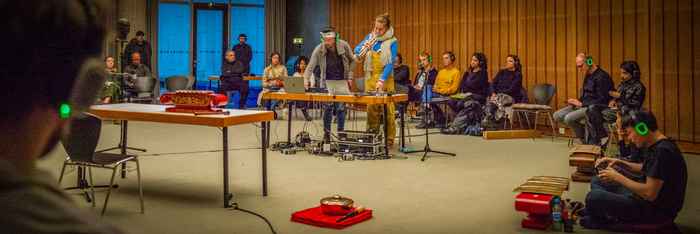Interferences: Live (Performance)
- Start date
- 29 May 2025
- End date
- 30 May 2025

Radio as an instrument of colonisation. From 1927, the colonial superpowers, including the Dutch, installed radio stations in Southeast Asia to control and dominate the ‘wild’ inhabitants. Shortly afterwards, the local population launched radiophonic counter-projects. Interferences: Live is a radio play, now performed live for the first time, about global understanding and its failure. A work by meLê yamomo, performed live at Goethe-Institut by gamelan master Krishna Sutedja (Gamelan Mudrasvara Ensemble) and composer-musician Thijs van den Geest.
The Philips company broadcasted the first radio programmes in the Dutch East Indies in 1927. Shortly afterwards, the French set up their radio stations in Indochina and the British launched the BBC's Empire Service. It wasn't long before the local population followed suit. Sultan Mangkunegaran VII of Solo in Java financed the Solo Radio Company, which began broadcasting in Javanese in 1933 and transmitted traditional music from Java. Since wireless signals do not stop at any border, the various colonies in Southeast Asia soon heard the popular music and anti-colonial voices of their neighbours.
Researcher and theatre-maker/composer meLê yamomo samples recordings of historical radio programmes from Germany, the Netherlands, Great Britain and Asia. In the process, it is possible to hear how global modernity and colonisation repeatedly stumble over the same mistakes. For gamelan master Krishna Sutedja it’s a unique first moment now that the work is played live at the Goethe-Institut.
About the artist
meLê yamomo is a researcher and theatre-maker/composer, who composes with time itself—stretching, layering, and bending it into new sonic landscapes. Their work is not simply about sound, but about the ghosts that inhabit it, the histories it carries, and the futures it dares to imagine.
Krishna Sutedja (he/him) is a Balinese musician and composer specialising particularly in Balinese gamelan, and electronic music. A graduate of Codarts University for the Arts in Rotterdam with a Master of Music, he has dedicated his career to bridging Indonesian and European musical traditions.
Composer and musician Thijs van den Geest (they/them) enjoys pushing the boundaries of their musical practice by collaborating with artists from other disciplines and genres. Thijs is also a member of the chromatic gamelan ensemble Multifoon, which explores the boundaries between contemporary Western classical music and Indonesian gamelan playing styles.
Interferences: Live | Goethe-Institut
Interview Panel: Thu 29, 17:00 | Doors: 16:45
Performance 1: Thu 29, 18:00 - 18:50 | Doors 17:50
Performance 2: Fri 30, 10:15 – 11:15 | Doors 10:00